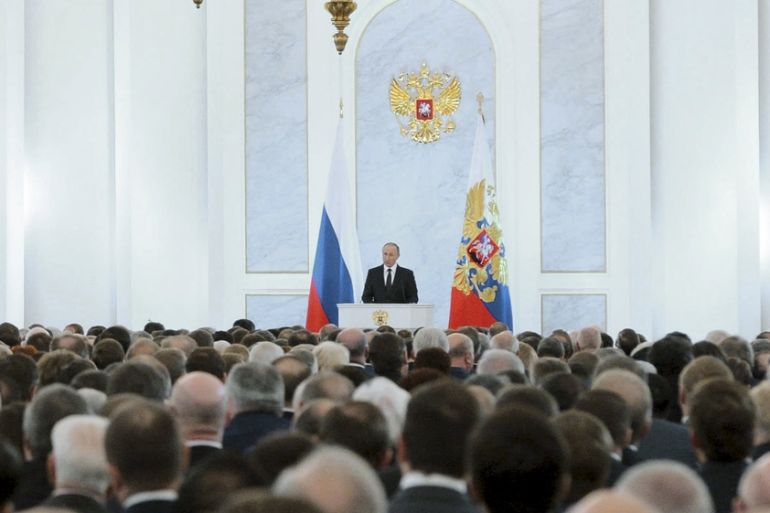Putin: Turkey will regret jet shooting ‘more than once’
In state-of-the-nation speech, Russian leader describes incident on Syria-Turkey border as “treacherous war crime”.

Russian President Vladimir Putin has warned Turkey it will “more than once” regret shooting down the Russian bomber jet near the Syrian-Turkish border.
Delivering his annual state-of-the-nation address on Thursday, Putin said Russia would not ignore what he described as Turkey’s “aiding of terrorists”, adding that the November shooting down of the Sukhoi Su-24 was a “treacherous war crime”.
Keep reading
list of 4 itemsPutin: Concert hall shooting is act of intimidation by Kyiv
How will the Moscow concert hall attack affect Putin?
Moscow theatre attack suspects show signs of beating in court
Putin also called for a broad international front against terrorism, an end to what he called double standards and halting any backing of what he called “terror groups”.
|
|
“We are not planning to engage in military sabre-rattling [with Turkey],” Putin said.
“But if anyone thinks that having committed this awful war crime, the murder of our people, that they are going to get away with some measures concerning their tomatoes or some limits on construction and other sectors, they are sorely mistaken.”
Moscow has already responded with measures including bans on some Turkish fruit and vegetables, and in his icy remarks Putin made clear that would not be the end of it.
“It appears that Allah decided to punish the ruling clique of Turkey by depriving them of wisdom and judgment,” Putin said.
He harshly criticised Turkey, accusing it of buying oil from the Islamic State of Iraq and the Levant (ISIL) group.
“We are fighting for justice, happiness and the entire future of our civilisation. We have to be prepared and we have to defeat them [terrorists] before they get here. That’s why we launched this operation in Syria.”
Marwan Bishara, Al Jazeera’s senior political analyst, said: “Putin’s speech echoed statements by US President George Bush after the September 11, 2001 attacks.
“Notably, his emphasis on terrorism and fighting terrorism in a world full of terrorism underlines the attack on Russian values, and makes it clear the likes of Turkey are either with Russia or with the terrorists.
“He didn’t give any signal of backing down. He seemed to be escalating the war of words with Turkey and other Russia detractors in Europe and the Middle East.”
OPINION: Turkey-Russia – The inevitable clash of the titans
Putin’s comments came a day after Sergey Lavrov, Russia’s foreign minister, said he was ready to meet his Turkish counterpart on the sidelines of a two-day Organisation of Security and Co-operation in Europe conference in Belgrade.
Later on Thursday, Lavrov met his Turkish counterpart Mevlut Cavusoglu. But he said he heard “nothing new” about the downing of the Russian plane.
Russia has escalated its dispute with Turkey by claiming to have evidence that proves President Recep Tayyip Erdogan and his family are benefiting from the illegal smuggling of oil from territory held by ISIL.
Q&A: Debate about Syria is missing one thing – Syrians
“Turkey is the main consumer of the oil stolen from its rightful owners, Syria and Iraq. According to information we’ve received, the senior political leadership of the country – President Erdogan and his family – are involved in this criminal business,” Anatoly Antonov, Russia’s deputy defence minister, said on Wednesday.
Turkey has vehemently denied Russia’s claims, with Erdogan saying again on Wednesday that he would resign from his post if they could be proved.
“Turkey has not lost its moral values as to buy oil from a terror organisation… Those who make such slanderous claims are obliged to prove them. If they do, I would not remain on the presidential seat for one minute,” Erdogan said.
“But those who make the claim must also give up their seat if they can’t prove it.”
Meanwhile, Serko Cevdet, head of the energy commission of the Iraqi Kurdish Regional Government, dismissed Russia’s claim, telling Anadolu news agency that recently published Russian satellite images showed tankers carrying oil from the Kurdish region to Turkey’s Port of Ceyhan.
Cevdet said it was impossible to transport oil from the ISIL-held areas to Turkey via the Kurdish region.
![Erdogan has said he will resign from his post if the Russians could provide evidence of their ISIL claims [EPA]](/wp-content/uploads/2015/11/e89007bb6a6c4ced9eacac465e548c7c_18.jpeg)